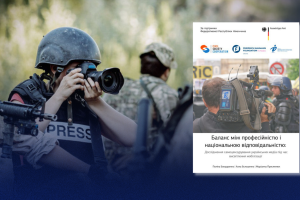
The results of the third wave of the 2018 USAID/ENGAGE Civic Engagement Poll demonstrates that trust in civil society has grown in the last nine months. 60% of citizens trust volunteer groups and 45% trust civic organizations, an increase from 53% and 40% respectively since September 2017. At the same time, the perception that the current government is ineffective persists, as citizens are starting to experience the effects of reform negatively. A growing share of citizens are now declaring that they are entirely against the reform process.
Civic participation and interest in activities has remained steady in the last year. Without any large political events shaking the status quo of Ukrainian society, current levels of civil engagement across demographics and activity remains largely unchanged since 2017. Approximately 25% of citizens were involved with at least one civil initiative in the last year, while the remaining 75% did not participate in civic engagements, describing involvement as futile and not worth their time or effort.
The poll also reveals that civic literacy remains low, although it has increased by a statistically significant margin since September 2017.
This executive summary provides an oversight of the key findings for Ukraine in relation to each of the broader research themes addressed in the survey.
The USAID/ENGAGE National Civic Engagement Poll is commissioned by Pact in the framework of the Enhance Non-Governmental Actors and Grassroots Engagement activity of USAID, implemented by Pact[1]. The survey concentrates on gauging citizen engagement of and participation in, and public attitudes towards civil society organizations, as well as citizens’ participation and perception of reform processes in Ukraine. Pact conducts three waves of the survey per year to trace short and mid-term trends in citizen engagement in and awareness of civil society activities. The information below comes from the second wave of the survey, which was conducted by GfK Ukraine in January 2018.
Field interviews were conducted with residents of Ukraine aged 18 years and older, face-to-face at respondents’ homes. The size of the sample is 2001 respondents and its design corresponds to the distribution of adult population of Ukraine by age, sex, oblast and settlement type (excluding AR Crimea and those areas in Donetsk and Luhansk oblasts that are not presently controlled by the government.) The margin of error of the sample is 2.2% (excluding the design effect.) For comparison reasons, results of similar surveys that were conducted by Pact under the USAID/UNITER project are shown along with the current results. The data charts can be downloaded here.
Overview of Findings
Appealing to individual interests is a prime motivator for participation
- Since September of 2017, levels of interest, disinterest and involvement in local initiatives has been stable. Currently, 7-8% of Ukrainians are actively engaged in their local community life. The other 17-21% rarely participate in meetings and activities. The share of those who are not engaged due to lack of interest gradually decreased from 43% in September 2017 to 39% in May 2018.
- The highest level of current engagement is reported for the creation of housing committees (8%) and participation in peaceful assembly (9%). The highest interest (37%) is still in reporting on a broken road and other infrastructure to local administration. At the same time, corruption and election violation related activities remained the most unpopular activities for Ukrainians.
- When asked whether there was anything that would motivate a citizen to engage in a civil initiative, approximately a third (31%) of respondents mentioned they would be motivated to participate if the activity directly related to their personal interests or their families. Interest in activities that are tangible and personal are also reflected in the most popular activities: creating local housing committees, participating in public hearings, and reporting broken roads or other infrastructure. As written previously, household issues matter most. If CSOs want to increase citizen engagement both in terms of quantity and quality, they need to convince citizens that participation in each activity relates to their personal and home life.
- The greatest barriers for active participation are lack of time and/or motivation. These are the major self-reported reasons why people cannot be more actively engaged in civil initiatives. 38% of Ukrainians site this reason. Notably, in Kherson Oblast, 61% of citizens declared the lack the time/motivation to get involved. When connecting with their constituency, CSOs need to demonstrate to citizens that engagement is worth their time and energy.
- Apathy towards participation in civil initiatives is also prevalent among citizens. 29% of Ukrainians do not believe that civil activities have any influence on the situation. Participating in an activity bent on improving social and political realities is viewed as a waste of time and not the responsibility of citizens. A mix of fatalism and paternalism among citizen is reflected in the percentage of citizens who believes that it is not even CSOs responsibility to fix the issues they are attempting to address. 23% believe that the state - instead of CSOs and civil organizations - should solve social issues.
Citizens experience reforms negatively
- The share of those who have not experienced consequences of reforms dropped markedly. In September 2017, 51% of respondents said they experienced no changes due to recent reforms, but today, 37% said that they have felt the impact of reforms in the country. This increase is likely a result of the launch of several reforms (education, health care).
- 34% of respondents declared that their experience with the new reforms in country has been only negative. This is an increase of approximately 10% since September of 2017. Only 2% of citizens cite that they only had positive experiences from reforms. This number is small in comparison to the growing negative perception of reforms, and has not changed since 2015
- The negative perception of reform may also reflect the sizeable and growing number of citizens who are entirely against the reform process. As of May 2018, it was a quarter of the population, 25%. This is a statistically significant increase from the beginning of the year as 22% were completely skeptical and unsupportive of the process.
- Citizens tend to have personal associations and indicators for how they perceive the reform process. For example, the most commonly cited indicators that a citizen might use is the general health of the economy, their levels of personal income, exchange rates, and the state’s capacity to provide services. This data again reflects how people come to understand political life on the national and local level through the prism of their own welfare.
- In terms of measuring which reforms have been the most noticed and or positive, decentralization was ranked among citizens as the most successful reform at 20%. This was then followed by medical (18%) and pension reform (18%). At the same time, 44% of Ukrainians cannot choose or indicate any successful reforms.
- Citizens continue to consider the top three issues in the country the Crisis in Donbas (51%), the economy (50%), and fighting corruption (47%)
- People think that corruption (39%), war (38%) and oligarchs (34%) are biggest obstacles to reforms in Ukraine.
Trust towards civil society grows as legitimacy of government stagnates
- Overall, trust towards volunteers, civil organization and activists is rising. Since September 2017, the percentage of those who trust volunteers and volunteer organizations increased from 53% to 60%. Those who trust civil organizations increased from 43 % to 45% and individual activists from 35 % to 40%. With weakening state legitimacy and increasing positive views of the social and civil actors outside of the formal political process, CSOs relative perceptive power is increasing.
- Citizens who trust CSOs view the respective individuals and organizations as not only legitimate but effective. More than a half of respondents (59%) who trust volunteers and volunteer organizations believe that they can solve current problems and help people. The issues that people expect CSOs to solve are not only communal and personal – like helping those in need – but also taking care of state affairs (20%).
- As was the case in the Pact’s other civic engagement polls, political parties suffer from low levels of popularity. The most popular political party was the All-Ukraine Union "Batkivshchina, receiving only 9% of the population’s support. Eight other political parties received 5% of the populations support or less.
- Furthermore, a sizable portion of the population remains apathetic towards the election and dissatisfied with the national government. When asked who would people vote for President, candidate choice was also spread wide and thin. Yuliya Tymoshenko gets the highest amount of support, but only 9%. One in three Ukrainians declare against all or will not attend elections at all.
Finding citizens who are active and interested in civic engagement
- There is no significant difference among citizen participation in terms of gender and age. However, the youth (18-24 years old) is less represented among those who have participated in civic initiative (8%), those who wish to be involved (9%), and those who have no desire (14%). The most potentially active portion of the population are those aged 25-34 years old.
- Citizens who participated in at least one activity somewhat more often live in small urban settlements (<50 thsd). Those citizens who did not engage in any activity but are interested in potentially participating mostly live in large cities (>500 thsd).
- Those who are civically active are significantly more educated, have higher incomes, and are likely employed when compared to those who do not participate civically.
This press-release was prepared by Pact as part of the USAID/ENGAGE program, which is funded by the United States Agency for International Development (USAID). The contents of this press-release is the sole responsibility of Pact and its implementing partners and do not necessary reflect the views of USAID or the United States Government.
[1]The purpose of USAID/ENGAGE is to increase citizen awareness of and engagement in civic activities at the national, regional, and local levels.








